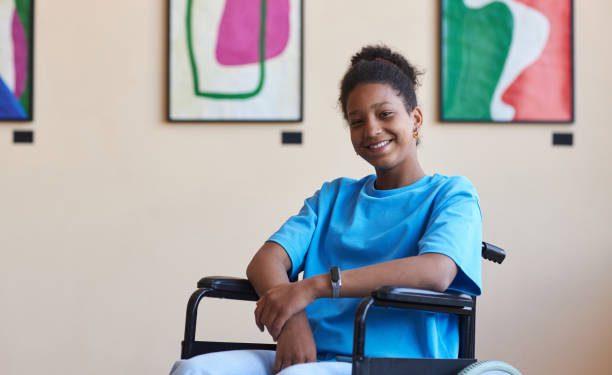In an environment where negligence often stifles dreams, Abosede Akanni (not real name), a sixteen-year-old S.S.S. 3 student at a government secondary school in Abeokuta, Ogun State, Nigeria, recounts how she survived polio, a disability that affects her mobility.
She now uses a wheelchair to aid her movements, breaks academic barriers and aspires to become a medical doctor. In this interview which was held with her (accompanied by her father), she narrates her story;
Ques: Can you speak about your background?
Resp: I am the second child and the only girl in a family of five, my parents grew up in Abeokuta. My father is a mechanic while my mother is a fashion designer. My mum loves education, maybe because she was deprived while growing up, she goes the extra mile to ensure we are in school. To appreciate her efforts, my siblings and I are doing fine academically. She cannot read but proudly shows our results to a graduate in the compound for explanations.
Ques: Can you talk about how you acquired this disability?
Resp: It is a result of negligence on the part of my parents; they just decided not to allow any of their children to be vaccinated. I believe that made me susceptible to polio. They have lost trust in our medical system. This could be attributed to ignorance, fear and belief that the vaccine will have harmful effects on their children. My parents claimed they were neither immunized nor vaccinated, they believed more in the use of herbs and concoctions while growing up.
Ques: Can you recount how the journey started?
Resp: My mother told me I fell sick when l was a year and some months, before this time, I crawled and had started taking some steps as a toddler, staggering, rising and falling sometimes until the illness struck making it difficult to stand unaided. They took me from one traditionalist to another seeking help, and fed me with different herbs and concoctions till l became well. Months later, they discovered I could no longer stand as before, run or even crawl to places. Reality dawned on them; they listened to advise to seek medical attention which they earlier declined, and quickly rushed me to a government-owned hospital where they got heart breaking information that l had lost my ability to walk and would not regain it as my limbs were paralyzed. My mother cried profusely holding me tightly to her chest. My dad felt like the ground had vanished beneath his feet. He was transfixed for hours until the doctor jerked him back to life.
Ques: How have you been coping?
Resp: Growing up, my mother has been a great assistance to me. She is my friend, confidant, a strong support system. She carried me everywhere till the age of six, and trained me to do some personal things myself. Other members of the family are also helpful, they have accepted me as part of them. My two brothers defend and fight for me anytime knowing the level of stigmatization people with disabilities are subjected to in society. With the aid of my wheelchair, I now have access to places on my own with little or no assistance. i go to school sometimes unaided as it is a stone’s throw from my house.
Ques: How are you coping with stigmatization in the community?
Resp: I have accepted my fate and constantly remind myself that people’s opinion does not and cannot define me, Sometimes, some of my friends and schoolmates call me unprintable names attached to my disability but l take pride in who I am recognizing my worth and aspiration extend beyond people’s perception of me.
Ques: What would you like to become in the future?
Resp: My goal is to become a medical doctor; a surgeon, in the future. Whenever I remember how my journey started, I feel sad and pray to God to help me so that l can render necessary assistance to those in my immediate community by offering medical services at low and affordable cost because if this is available to all, the thoughts of depending on herbs for healing and avoiding high medical bills would be a forgotten issue in the community and country at large.
Ques: What is your message to the public on treating people with disability?
Resp: It is high time people changed their perceptions about people with disabilities. They should see us as human beings. We are not less human, our positions will not diminish our self-worth. Many of us are victims of circumstances but when there is life, there is hope. If life offers you lemon, make lemonade juice out of it. Let us support one another, creating a community where everyone feels valued, appreciated and respected.
This interview was conducted by Oluwatoyin Farotimi, MSc Student of Mass Communication, University of Lagos, following the training on Disability Reporting facilitated by Blessing Oladunjoye, Publisher of BONews Service

